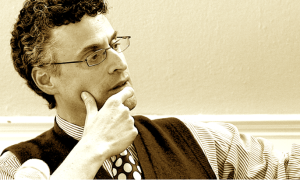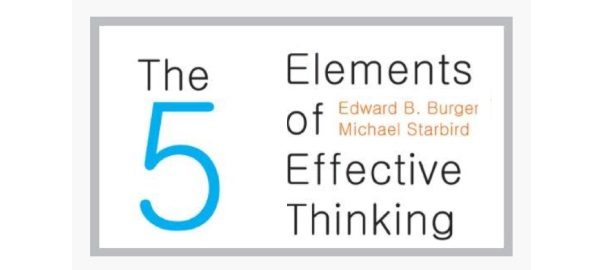April 2, 2014 — Edward Burger, PhD
with Louise Kuo Habakus and Alison MacNeil
Do you think about… how you think?
Is this something that can be done differently, let alone more effectively? Can we inspire our children to do the same?
Ed Burger thinks so. He and co-author Michael Starbird have a new book called The 5 Elements of Effective Thinking that offers concrete strategies on how to provoke ourselves into a more brilliant thought process.
Thinking about thinking sounds like a philosophical and right-brained discussion. It’s more intuitive, subjective, and, well, thoughtful.
Beyond an interest in this topic, what drew us to their book is that the authors are mathematicians and long-time teachers who have been observing college students for decades.
We want to know about these kids that are showing up on campus as 18 and 19 year olds. Are they ready to take advantage of the experience or is college merely a place to party, a ticket to punch, and a degree to grab? What makes kids want to learn? Which students become critical thinkers and engaged, passionate learners? Are they the ones with the highest test scores? How do they feel about this test prep cottage industry that has emerged? What do they want to tell parents?
 Ed is a nationally known mathematics professor, educational innovator, and president of Southwestern University. He was on the faculty and served in leadership roles at Williams College since 1990. Michael is a professor of mathematics at the University of Texas at Austin. They draw upon the five Chinese elements–earth, fire, air, water, and the quintessential element–as a sort of “intellectual GPS” to explain their recommendations and techniques.
Ed is a nationally known mathematics professor, educational innovator, and president of Southwestern University. He was on the faculty and served in leadership roles at Williams College since 1990. Michael is a professor of mathematics at the University of Texas at Austin. They draw upon the five Chinese elements–earth, fire, air, water, and the quintessential element–as a sort of “intellectual GPS” to explain their recommendations and techniques.
- Earth: Understand deeply
- Fire: Make mistakes
- Air: Raise questions
- Water: Follow the flow of ideas
- QE: Change
They say that very ordinary people can engage in extraordinary thinking to accomplish great things. The first step? When you learn anything, start simple, go deep, and make it rock solid.
In our opinion, you can take these elements and use them as “mottos” or mantras, when your children hit a roadblock in their learning. Different challenges require different strategies.
We’ll also ask Ed how this framework might help with parenting. He says:
Bringing up children requires making many decisions on a daily basis. Getting advice about every scenario is impractical. Instead, identify one or two essential goals and use them to guide your actions. For example…
We’re not going to give it all away! We’ll be talking with Ed about ways to sharpen our thinking, so we can inspire our kids with their learning, and ourselves by making better parenting and life decisions.
 Louise Kuo Habakus is Executive Director of Fearless Parent, lead host and producer of Fearless Parent Radio, and mom of two. She is a published author, runs the non-profit Center for Personal Rights, lectures widely, and has appeared in numerous media outlets, including ABC World News Tonight, Fox & Friends, and The New York Times. Louise was a Bain consultant and a C-level executive in the financial services industry. She holds two degrees from Stanford University. She is an advisory board member of GreenMedInfo.
Louise Kuo Habakus is Executive Director of Fearless Parent, lead host and producer of Fearless Parent Radio, and mom of two. She is a published author, runs the non-profit Center for Personal Rights, lectures widely, and has appeared in numerous media outlets, including ABC World News Tonight, Fox & Friends, and The New York Times. Louise was a Bain consultant and a C-level executive in the financial services industry. She holds two degrees from Stanford University. She is an advisory board member of GreenMedInfo.
 Alison MacNeil, MSW, LICSW is a social worker and psychotherapist with more than 15 years of clinical experience. She holds degrees from Trinity College and the Smith College School for Social Work. Her professional background includes positions with a community mental health center in southeastern Massachusetts, Family Services of Greater Boston, and Beth Israel Deaconess Medical Center’s Healthcare Associates. Alison is a published author and a co-founder of the Thinking Moms’ Revolution.
Alison MacNeil, MSW, LICSW is a social worker and psychotherapist with more than 15 years of clinical experience. She holds degrees from Trinity College and the Smith College School for Social Work. Her professional background includes positions with a community mental health center in southeastern Massachusetts, Family Services of Greater Boston, and Beth Israel Deaconess Medical Center’s Healthcare Associates. Alison is a published author and a co-founder of the Thinking Moms’ Revolution.













Loved this program! First of all I love math and now I love this guy, Ed Burger. Even though I like learning, no one has ever made me think of education as fun and exciting. I can’t wait to read “5 Elements of Effective Thinking”.